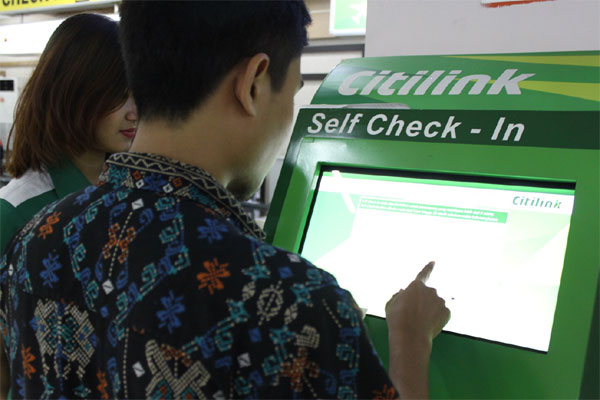
Citilink Indonesia Self-Check-In service that is available at the Airport.
In the first of Microsoft Asia’s Data Culture Champions in Asia series, we look how Achmad Royhan, VP of Information Technology at Citilink Indonesia led his team to embrace data to drive new revenue streams for the company, in its bid to become the country’s leading low-cost airline.
The airline industry globally is facing up to the threat and opportunity of disruptions. According to PwC's Global CEO Survey[1], airline CEOs' assessment of the level of disruption is higher than those of CEOs from other sectors across five forces of disruption – competition, technology, customer behavior, regulation and distribution channels.
Achmad Royhan, VP of Information Technology at Citilink, Indonesia's fastest growing low-cost airline, is confident his team can turn this disruption to their advantage.
"In less than four years of Citilink's inception, we've come a long way. We now operate a fleet of 37 Airbus 320s and five Boeing 737s, fly to 29 cities in Indonesia and have more than 8 million passengers every year. Market potential is large and with more than 230 airports to cover in Indonesia, we're only just starting," shared Royhan.
Royhan's optimistic prediction of the airline industry growth in Indonesia is in line with forecasts by the International Air Transport Association (IATA) that represents 260 airlines across the globe. IATA named Indonesia as one of the top five fastest-growing markets for additional passengers per year by 2034[2].
"We expect more passengers, but we also foresee their demands to be new. To meet their demands and make our airline their preferred choice, we need to know them better. Traditionally, we have been doing this through good customer service and sometimes, even guess work. With technological advancements, I don't see why we need to rely on 'guess work' to make decisions anymore. We have started to look at solid data to predict what our customers want," adds Royhan.
New insights lead to new revenue streams
In a market where competition is rife and profit margins slim, the need to churn existing data into actionable insights and create new revenue streams is more important than ever. For Royhan and his management team, planning and optimizing both existing and new flight routes so that Citilink can reach more customers across Indonesia is top of mind.
In Asia-Pacific, outside of China and India, Indonesia is predicted to grow into the largest domestic market, growing at 6.4 per cent and adding an extra 136 million passengers a year[3]. To Royhan, learning what this huge customer base needs and wants is crucial to maintaining customer loyalty and acquiring new customers.
Royhan explains: "Domestic customers book travel – on our website, third party websites or with travel agencies. If we could spot the trends and spikes in customer demand well in advance, we are able to pre-emptively adjust flight routes and schedules, maximizing our use of resources and increasing revenue."
A likely scenario plays out like this – the marketing team imports data from online booking websites and observes that there is a trending increase in demand for flights from Jakarta to Yogyakarta. They then share this insight in real time with the network planning team. This insight is used to make adjustments to current planned flights, accommodating increased demand.
A new Data Culture needed
With the right tools, valuable business insights can come from anyone, anywhere, at any time. Royhan noticed a culture that thrives on data, a data culture, was lacking at Citilink: "Initially, we relied on Excel spreadsheets to compile and deliver data to stakeholders. This method was unwieldy and slow. Insights obtained were often delivered too late to be acted upon."
In fact, decision makers in Indonesia rank 'real time business decision making' as the top benefit of embracing a data culture, according to the Microsoft Asia Data Culture study that surveyed 940 senior business leaders across Asia [4].
Royhan insisted on equipping a broad spectrum of employees with the right, easy-to-use tools, to nurture and grow analytical skills amongst Citilink's work force. Power BI, a suite of business analytics tools, was incorporated to import data quickly from a range of sources and enable staff to generate insightful reports.
"The time between ingesting data and obtaining insights has shortened significantly, and now customer insights can be shared within minutes across teams," he added.
Adopting more data intensive approaches meant that Citilink needed the IT infrastructure to scale with growing data storage and computing needs. Royhan pioneered the movement of Citilink's day-to-day operations and management data to Microsoft Azure. "This meant our internal IT team could focus on assisting management with rolling out new data tools and training staff."
Getting all levels of staff on board
Royhan's vision for the company was a hit with many in the company, especially the senior decision makers, who were keen to see data translated into actionable insights and new revenue streams.
He had full support from Citilink's CEO, Albert Burhan, who saw true long term benefits of Royhan's strategy. "We attach a high value to the role that technology can play in our relationship with customers. Royhan's vision of turning the disruption of the changing customer landscape to our advantage using technology struck a chord with the management team and is aligned to our values," said Burhan.
Citilink's Data Culture journey was not without its challenges. In fact, Royhan experienced much resistance from the ground staff.
"To their credit, our day to day staff are no doubt already inundated with running the operations in the various cities we are present in. My team and I had to prioritize convincing them of the benefits of our data driven strategy. It was not just about serving our customers better but also enabling our staff to do their job faster and more efficiently," shared Royhan.
Royhan focused on three key areas to get everyone on board with this journey:
Offering management support
Royhan and his leadership team ensured they were at the forefront, setting an example for the rest of the company to follow. All of Citilink's senior management team and department heads are trained in using Power BI to analyse data and predict business outcomes.
"The vision we have for the company cannot be shared with just the management team. The entire company needs to be aware of it and confident that their managers are consistent, supportive and completely behind the vision," Royhan surmised.
Conducting show-and-tells
Visual reports and dashboards were developed using Power BI to show station managers the improved business insights they could obtain.
"When we showed our station managers how easy it is to use the dashboard to discover what the market's largest payment channels were and who their best travel agents were, they became very open to using the tool," said Royhan.
Royhan has parked nearly a fifth of Citilink's IT budget for data, and expects this figure will only continue to grow over time. His decision stems from the reality that a data centric strategy requires the right infrastructure in place for employees to make optimum use of analytical tools.
"Our staff are dealing with more and more data by the day. What would most frustrate them is slow data processing that could sometimes take days with less modern infrastructure. To avoid this situation, we need our infrastructure to scale with huge amounts of data and this definitely fuelled our move to the cloud," explains Royhan.
Citilink's Data Culture journey has honed an organization that stresses the use of modern technology, training of staff across the board and aligning the management team to project a unified vision – all in the name of staying relevant to its customers.
The right infrastructure
Royhan acknowledges that the airline industry will continue to be disrupted by external forces and is planning ahead to make greater use of data. With a predicted 270 million passengers in Indonesia by 2034, we wonder what new things Royhan and his team will discover about them.
In our Data Culture Champions in Asia series, we profile senior executives across the region who have driven a new data culture within their organization by adopting new processes, technologies as well as enabling their people with skill sets. These individuals cut across key industries and organization sizes, but what makes them stand out above the rest is how they are embracing change.
[1] PwC's Global CEO Survey includes the findings from 1,322 surveys of business leaders across 77 countries. http://www.pwc.com/us/en/industrial-products/publications/assets/pwc_2015_global_airline_ceo_survey.pdf
[2]New IATA Passenger Forecast Reveals Fast-Growing Markets of the Future: http://www.iata.org/pressroom/pr/Pages/2014-10-16-01.aspx
[3]New IATA Passenger Forecast Reveals Fast-Growing Markets of the Future: http://www.iata.org/pressroom/pr/Pages/2014-10-16-01.aspx
[4] Business leaders in Asia believe that a new data culture is needed for successful digital transformation: http://news.microsoft.com/apac/2016/05/10/business-leaders-in-asia-believe-that-a-new-data-culture-is-needed-for-successful-digital-transformation/#sm.00001lhcgkp8v3fdtybev3qo53vc6
Tatiana is the news coordinator for TravelDailyNews Media Network (traveldailynews.gr, traveldailynews.com and traveldailynews.asia). Her role includes monitoring the hundreds of news sources of TravelDailyNews Media Network and skimming the most important according to our strategy.
She holds a Bachelor's degree in Communication & Mass Media from Panteion University of Political & Social Studies of Athens and she has been editor and editor-in-chief in various economic magazines and newspapers.






































































































































































